- Home
- Jane Smiley
Gee Whiz Page 8
Gee Whiz Read online
Page 8
* * *
It was my turn to get up in the morning to feed the horses. My alarm was set for six, a little later than usual, because there was no school and I didn’t have to catch the bus. It was pretty dark at six. We’d talked about the winter solstice in seventh-grade science, and traced the apparent path of the sun. What it looked like that last week before the solstice was that it just made a little oval from the southeast to the southwest. The rays started out really long and cold and didn’t get much shorter and warmer. I knew we were lucky compared to lots of places, but just because you are lucky doesn’t mean that you feel lucky. Anyway, it seemed like it took me forever to pull on my socks and my jeans and my five shirts and sweaters and my hat and my gloves, and I was yawning the whole time, but I woke up when I opened the back door and stepped out on the porch. Right there in the yard, standing and looking at me, maybe ten feet from the back porch, was Gee Whiz. When I stopped with the back door in my hand, staring at him in surprise, he nickered, just like he was saying, “We’re hungry.”
I turned and looked at the kitchen clock. It was six-thirty. Other than Gee Whiz standing there, everything in the yard seemed normal—quiet, the sky pale the way it got just before sunrise. I put on my boots, and went down the steps. He stood still as I approached him. I petted him down the neck and took hold of his forelock, to get him to turn with me and go back to the barn, which was closer than the gelding pasture, but he didn’t need pulling—he just pivoted and followed me, arching his neck, flaring his nostrils, and snorting slightly, as if he wanted a good whiff of me. He truly was the most curious horse I’d ever known.
We walked to the barn. From there, I could see that the gate of the gelding pasture was open, but not wide open—Gee Whiz had pushed it far enough to get through. Blue, Marcus, Lincoln, and Beebop were standing just inside, but they hadn’t come out because, yes, Rusty was sitting in the opening, perfectly straight and alert. When Blue looked at me and stepped forward, she barked one short, sharp bark that said, “Stay!” in every language, including Horse. I led Gee Whiz toward them, but when I took a halter off the gate and turned to put it on him, just to make sure that I got him through without problems, he twisted his head away and trotted to the mare pasture. The mares, of course, were all eyes and ears—nothing more exciting than a loose horse—and they snorted and whinnied when he approached. I closed the gelding gate. Rusty gave a sigh, as if she were glad that her job was done, and she received several pats from me. There was no telling how long she’d been guarding the gate.
Gee Whiz would not allow me to catch him. He had to sniff noses with each mare in turn decide—like everyone, I suppose—that Oh My was the best-looking, since he snorted and arched his neck when he came to her.
For once in my life, I didn’t have a single carrot in my pockets, so I ran to the barn and got a small bucket with a few handfuls of oats. This I shook as I came back to him, and he did prick his ears, and he did take a bite while I was opening the gate again, and he did allow me to lure him inside the pasture (waving off the other geldings, of course). I then stood with him while he ate the rest of the oats, because even though he had been naughty, he had been good to follow me and needed to be rewarded. All the horses were staring at me now, and the reason was that I was late with breakfast.
After I passed out the hay, I inspected the gate latch. It was a simple one—just a piece of wood that slid through a space in the frame of the gate, and then lodged itself into a carved-out slot in the gatepost. The latch was old and un-painted, not that easy to move. I fiddled with it while the horses ate, and I decided that in the excitement of the night before, someone hadn’t closed it properly (maybe me). I made sure the latch was very firmly in its slot, and even jiggled it. I decided that the episode had been a little scary, but easy to understand, so I also decided to just put it out of my mind—lots of times there are near misses with horses. If you didn’t put them out of your mind, your mind would fill up and overflow.
Chapter 6
WHEN I GOT INSIDE, MOM WAS UP, MAKING OATMEAL. SHE still didn’t look very happy, but I took the cowardly way out and decided that this wasn’t my business. She set my oatmeal on the table, and I reached for the milk. I said, “You remember the slumber party tomorrow night, don’t you?”
She nodded, and said, “Oh yes.”
“Did you talk to Dad about it?”
“I did. It’s okay for you to go, but he wants to pick you up before breakfast Thursday morning so that you can get your riding done.”
“Did you explain to him what a slumber party is? People stay up late.”
“I mentioned that, but he didn’t seem to notice.”
She stared at me. I could see that her mind was working. Finally, she said, “I think we need to do some Christmas shopping. I think it absolutely has to be done Thursday morning. I think it’s an emergency.”
We smiled at one another. I said, “What time do you think you’ll be finished with that?”
“Oh, about noon.”
When you went to the Goldmans’, you never knew what was going to happen. Once, we’d put on an amateur (very amateur) performance of Julius Caesar; once, we had played a game where you had to act out an adverb, like “crazily,” and your team had to guess what it was; and of course, at the end of the summer, we’d had a scavenger hunt through the neighborhood. You also never knew why a particular person might have been invited to a Goldman party (and actually, I wondered why they had originally invited me—Barbie said it was because I was mysterious, which I suppose meant that I spent years trying to keep out of everyone’s way as best I could). Now, of course, we were friends, and I loved having Barbie come and ride Blue. She was easy to give lessons to—she always did what she was told, and she was able to do what she was told, which is a separate thing.
Sophia was arriving as Mom and I turned into the Goldmans’ street. The Cougar that her mom drove was inching along, no doubt because they were looking at street numbers. Mom eased around them and went into the Goldmans’ driveway, and I jumped out and waved. Mrs. Rosebury pulled in behind us. Maybe I expected Sophia to be nervous—she didn’t know the Goldmans, though she had seen them a long time ago in a play—but if she was, I couldn’t tell. She was her usual self—she might as well have been walking into geology as into the Goldmans’ house. Barbie met us at the door before we rang the bell, as if she’d been watching through the window. She hugged me, and shook Sophia’s hand, then said, “I’m so happy to meet you! Abby says that your equestrian style is perfect! She gives me lessons, you know, but I have a long way to go.”
Sophia smiled. Good beginning. Another interesting thing was that Sophia’s hair was loose rather than in her usual thick braids. It was blond and smooth and rippled down her back as she walked. It fell to her waist. Stella would have been full of compliments.
Being in the Goldmans’ house was almost like not being inside a house at all. The living room had a huge window that looked out over a big valley—now the valley was utterly dark, and the sky above and beyond the edge of the hills was brilliant red-orange. We set down our overnight bags next to three others. Sophia had brought a sleeping bag, and I had brought what Mom called a bedroll, which was really just a blanket and a sheet folded together and rolled up. Doors at either end of the window opened out onto a deck. I could see Leslie, Alexis, and a girl I didn’t know out there. Leslie waved to us and Sophia waved back.
To the left of the living room was a big kitchen, and to the right was Mr. Goldman’s study. I saw that the furniture had been pushed aside, so this would be where the slumber party would take place, not upstairs in Barbie and Alexis’s rooms. (There were two—they slept in one of them in bunk beds, and had their musical instruments and a table of art supplies in the other one. They were the only kids I’d ever known who had been allowed to decorate their own rooms, by painting pictures on the walls—I hoped Sophia would get to have a look.) Staccato was curled up on a pillow on the couch. He’d put on weight in the last fe
w months, and looked like a grown-up cat. When we’d found him in the spring, Mom thought he was less than a month old, so he was still only about nine months. But he was relaxed. When I tickled the top of his head, he rolled over and displayed his belly. He started purring immediately. I said to Barbie, “Does Staccato ever do anything? Every time I see him, he’s relaxing.”
“He caught a fly yesterday. But it was a very slow-moving fly.”
The doorbell rang and she went to answer it. Another girl I didn’t know came in, followed by Lucia. Barbie must have said something funny, because they started laughing, and then smiled at us and said, “Hi!”
Mrs. Goldman came down the stairs, smiling, and said, “Oh, how nice to see all of you girls! How are you? You look so grown-up!” She gave everyone a kiss on the cheek and went into the kitchen.
As we drifted out onto the deck, Lucia said, “I was wondering who would be here!” I suspected not Stella and Gloria, and by the time everyone had arrived, I saw that I was right. One surprise was that Leah did come, and why not? She was their cousin even if she was four years older and in college. She gave me a hug that said all sorts of things from “I think I love your brother” to “What is going to happen now?” But Leah was quiet—at Goldman parties, she never said much, though she drew funny pictures on napkins and showed them to you sometimes. It was a sign of how much fun the Goldman twins were that Leah had decided to show up.
On the deck, there were five artichokes set on two tables, ready for the leaves to be plucked and dipped in five sauces. I could tell that one was melted butter. The others were white, green, red, and brown. There were two cheeses, neither of which looked like anything I’d seen before (they were white), and there was a long loaf of bread. I must have been staring at the food, because Leslie came up behind me and said, “I recognize the olives and the almonds.” She took one of each.
Leslie had on her favorite sweater, which was blue-green and had a boatneck. She was wearing it with very dark blue wool pants that I had never seen before—buttons came up one side, crossed under the waist, and went down the other side. I said, “Where did you get those pants?”
“They’re navy surplus. They’re what sailors wear.”
She stepped back. The bell-bottom legs were so big it looked like she could trip on the hems. She turned around. A string like a shoestring was threaded through holes that ran up the back. And they did fit her nicely. She said, “If I fell off my ship, I could get these off over my shoes, and then tie the legs, throw them upward to capture some air, and use them as sort of a life raft. Then I would take off my shoes.” I was sure that she would survive. She did look good—willowy and “understated,” as Stella would say.
Alexis made introductions. Other than Sophia, Leslie, Lucia, Leah, and me, there was Diana (Alexis’s roommate from school); Ingrid, a cousin of Diana’s from Norway; and another girl from school who hadn’t gone home for vacation, Marie. Marie was French. I did not dare say bonjour, even though I’d been taking French for three years. Marie was staying for a couple of days, until she left to meet her parents in Aspen, Colorado, to go skiing. Sophia said, “I went to Paris once, with my mom and dad. I can’t remember it very well, though.”
Marie smiled, and said, “I am from the South. From Toulouse. My father teaches in the university there.”
None of us had maybe ever heard of anywhere in France except Paris, and wherever it was Joan of Arc was from. Alexis said, “Marie is a great skier.” Marie shrugged slightly, then helped herself to a piece of the white cheese. Ingrid, as it turned out, spoke German, French, and Norwegian but not English, so she chatted with Marie in French. Neither of them sounded at all like our French teacher, Madame Desmond—or Madame Defarge, as she was called behind her back. Sometimes, when she was being very strict, a couple of the boys would pretend to be knitting.
Diana and Ingrid had come down from San Francisco just for the party because, as Diana said, “Every time I tell my folks about Alexis and Barbie, they roll their eyes as if I’m making it up. I had to bring an independent witness.” I started liking her right then. Diana’s talent was math. The Jackson School had already given up on teaching her, and she went three times a week to UCLA for classes. She said, “There was a school I could have gone to in SF that had high-level math classes, but my folks also wanted me to learn how to tie my shoes and put the cap back on the toothpaste.”
Alexis said, “We’ve been working on that. If I were your mom, I would settle for you not sitting on your glasses every other day.”
Diana laughed.
Mrs. Goldman came out carrying another dish—this one was a metal frame with a pot sitting on it. Under the pot was a flame. In the pot was something thick and liquidy. Marie said, “Ah, très bon! Fondue au fromage!” A moment later, Mrs. Goldman came out with another plate, this one of pieces of carrots and broccoli and green beans. Marie and Ingrid sat down at once and started tearing apart the loaf of bread, sticking pieces onto the prongs of long forks, and dipping them into the cheese (I did know what fromage was). The rest of us sat down with them. Surprisingly, Sophia, who hardly ever ate anything, dipped three pieces of bread and ate them, then tried a carrot and a green bean. Leslie and I looked at each other—we spent a lot of lunch hours watching Sophia eat and offering her things we thought she might (should) like.
Mrs. Goldman brought in another pot. This one had bubbling oil in it (we had to move out of the way when she set it on the table). Then she brought in a plate of beef cubes and two sauces, one that was orange and sweet and another that looked like barbecue sauce. She told us not to have more than six forks in either pot, or the fondue would cool off, so we took turns. I did like the cheese, and I did like the beef without sauce or with a little of the barbecue sauce. Leslie ate a little bit of everything, and Sophia ate two pieces of beef and two more chunks of bread and cheese.
Dinner by fondue takes a while, and the whole time, we were talking. Marie told about skiing in the Alps and the Pyrenees. Ingrid talked about how wonderful it was to see ten hours of daylight so close to Christmas (Diana translated for her, and said that in Oslo, the sun was coming up at about nine-thirty and going down at about three). Leslie said that she was running three miles without stopping for a rest, and had heard about a thing called a marathon, and then it turned out that a marathon was twenty-six miles. Sophia told about Onyx and Pie in the Sky. Barbie told about Blue and Tooter, and Alexis said that there was a teacher at the high school who taught scuba diving, and explained what that was, and that was a reason she wanted to come back and go to our high school. Lucia said that she had taken that course in the summer, and that the bay, which we could walk to from school, was actually a deep canyon—two miles from the surface to the bottom in some spots, and even below the water, as deep as the Grand Canyon. I had been sitting at lunch with Lucia for ages, but she was so quiet that I didn’t know any of this. Leah asked if we remembered a show on TV called Sea Hunt, but no one did. Leah said that everyone in Berkeley was a vegetarian, and ate something called tofu, which was made of soybeans and came in various shapes, like chicken legs and liver and Mars bars. I told about Gee Whiz’s career at the racetrack, and about his getting out of the pasture and coming to stand by the porch while Rusty prevented the other horses from escaping.
The conversation went in fits and starts because we were also trying to dip our forks and not spill. There could have been some sort of bragging, since I had the sense that everyone there was quite good at something or other, but there wasn’t—bit by bit, everyone loosened up, so that by the time Mrs. Goldman brought the last pot, we were laughing most of the time. The last pot was chocolate, dark and thick, and incredibly wonderful-smelling. We got little cubes of angel food cake to dip into it. Marie said that her favorite fondue au chocolat was with strawberries and raspberries. I could only imagine it. We did make kind of a mess with the chocolate fondue.
When we went back into the living room and Alexis turned on the lights, I saw that they had se
t out a large white mat with rows of brightly colored spots on it. “Oh,” said Leslie, “Twister!” And indeed, TWISTER was written across one edge. There were ten of us, too many for one game, so we took numbers out of a bowl. Numbers 1 through 4 began the game while number 5 twirled the spinner and told each participant where to put each hand or foot. When an elbow or a knee touched the mat, or someone fell, she was out; the next number came in, and the first open number took over twirling the spinner. While we played the game, the stereo was on, a stack of records of all kinds, including the Rolling Stones and the Lovin’ Spoonful, but also Martha and the Vandellas, Ray Charles, and an old record of Marie’s by Edith Piaf. There was even one my dad might have liked, Patsy Cline. The music made it more fun, and pretty soon we were all dancing around and shouting if we weren’t playing.
Sophia got number 3, and of course she was good at the game—she could twist most of the way around but hold herself perfectly still. She outlasted numbers 1, 2, 4, 5, and 6, and maybe she only buckled then because she was tired. I was number 7. My first turns were very easy, mostly like crawling across the mat, but then I had to reach my right hand under my body and put it way past my left foot, and I fell over, knocking over Ingrid. Leslie ended up completely upside down, her hands and feet spread wide, looking upward, and after she had been there for a while, Barbie started counting out seconds to see how long she was going to last—she made it to thirty-six seconds, which seemed like a lot, and then she started laughing when Alexis ran a feather up her right bell-bottom and tickled her on the leg. Even laughing, she lasted another eight seconds, which was, I said, as long as you were supposed to stay on a bucking bronco, and then Barbie had me tell them about Beebop, her “future mount.”
I think we made it through the Twister lineup two and a half times before Alexis brought out the playing cards and started telling our fortunes with a dish towel wrapped around her head, and Barbie standing behind her mouthing the words “Don’t believe a thing she says!” Her predictions were that Marie was going to go skiing, I was going to go riding, Leslie was going to run three miles, and Sophia was going to go on a trail ride with Barbie and have to save her life by galloping alongside her and dragging her off her horse as they galloped toward a cliff while an earthquake was taking place.

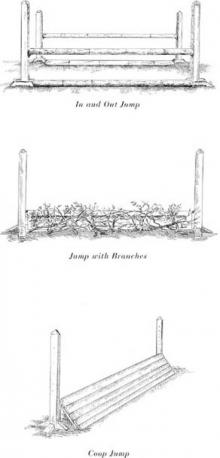 The Georges and the Jewels
The Georges and the Jewels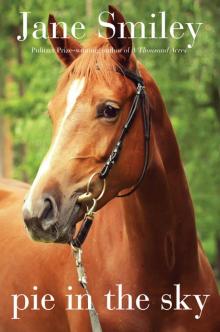 Pie in the Sky: Book Four of the Horses of Oak Valley Ranch
Pie in the Sky: Book Four of the Horses of Oak Valley Ranch Duplicate Keys
Duplicate Keys Charles Dickens
Charles Dickens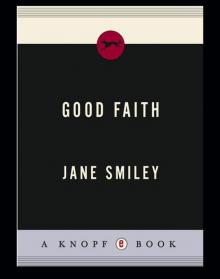 Good Faith
Good Faith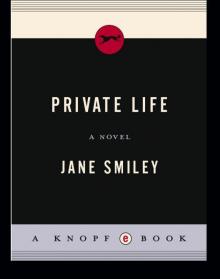 Private Life
Private Life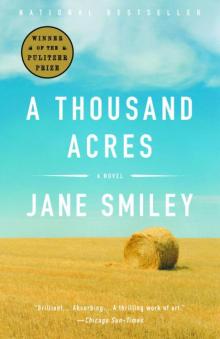 A Thousand Acres: A Novel
A Thousand Acres: A Novel The Greenlanders
The Greenlanders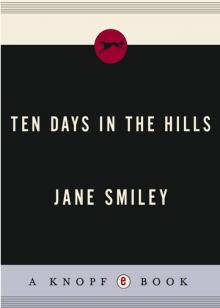 Ten Days in the Hills
Ten Days in the Hills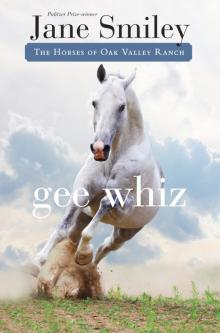 Gee Whiz: Book Five of the Horses of Oak Valley Ranch
Gee Whiz: Book Five of the Horses of Oak Valley Ranch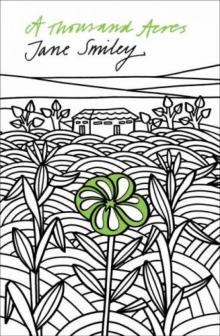 A Thousand Acres
A Thousand Acres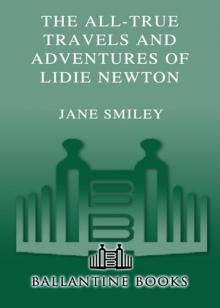 The All-True Travels and Adventures of Lidie Newton
The All-True Travels and Adventures of Lidie Newton Ordinary Love and Good Will
Ordinary Love and Good Will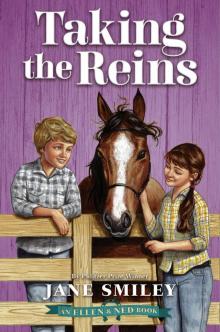 Taking the Reins (An Ellen & Ned Book)
Taking the Reins (An Ellen & Ned Book) The Man Who Invented the Computer
The Man Who Invented the Computer Horse Heaven
Horse Heaven The Age of Grief
The Age of Grief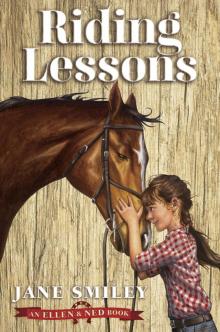 Riding Lessons
Riding Lessons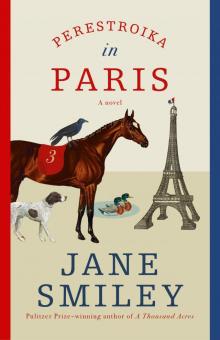 Perestroika in Paris
Perestroika in Paris A Good Horse: Book Two of the Horses of Oak Valley Ranch
A Good Horse: Book Two of the Horses of Oak Valley Ranch Saddles & Secrets (An Ellen & Ned Book)
Saddles & Secrets (An Ellen & Ned Book)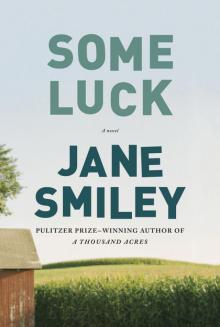 Some Luck: A Novel
Some Luck: A Novel Champion Horse
Champion Horse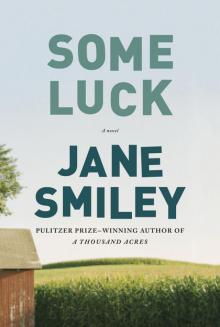 Some Luck
Some Luck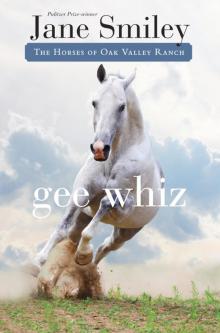 Gee Whiz
Gee Whiz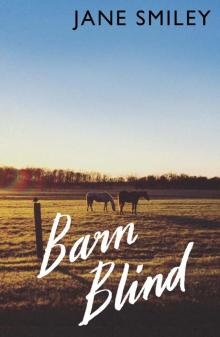 Barn Blind
Barn Blind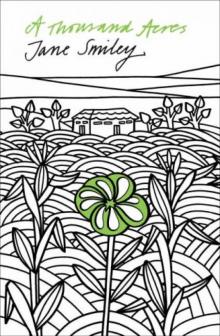 A Thousand Acres (1992 Pulitzer Prize)
A Thousand Acres (1992 Pulitzer Prize)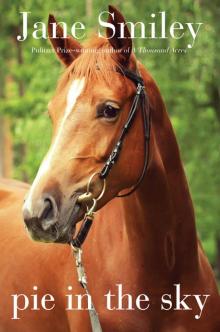 Pie in the Sky
Pie in the Sky True Blue
True Blue A Thousand Acres_A Novel
A Thousand Acres_A Novel A Good Horse
A Good Horse